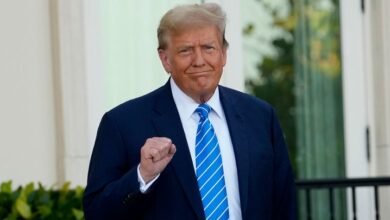
Former President Donald Trump is currently ensnared in a challenging legal dilemma as he and his team deliberate over whether he should testify in his criminal hush money case. Jury consultant Steve Duffy conveyed to the Independent on Wednesday that Trump finds himself in a precarious position, facing significant risks whether he decides to take the stand or not in the ongoing trial in Manhattan.
Trump, who has pleaded not guilty to 34 counts of falsifying business records to conceal payments made to adult film star Stormy Daniels before the 2016 presidential election, has expressed a desire to testify. However, legal experts are cautioning against this, labeling it a potential “disaster.” This advice stems from concerns about Trump’s public speaking tendencies, which often stray from cautious or measured discourse.
“Jurors generally don’t react well to criminal defendants not testifying, because it just leads to speculation about, ‘Why – what do you have to hide?’” Duffy told the Independent. “This is someone who plays very loose and fast with the truth generally,” Duffy said of Trump. “So the odds that he gets caught in a contradiction or undermines his own testimony I think would be very high.” “Yeah, I would testify,” Trump said during a Mar-a-Lago witch hunt rant last month. “That’s not a trial, that’s a scam.”
The crux of the case involves allegations that Trump paid Daniels to prevent her from disclosing a past affair during his presidential campaign, an affair Trump vehemently denies. Adding another layer to the controversy, Trump has characterized the prosecution led by Manhattan District Attorney Alvin Bragg as a politically motivated “witch hunt,” although he has not provided evidence to support this claim.
Steve Duffy’s comments highlight the complex strategic decisions facing defendants in criminal trials. He noted that testifying could be a “lose-lose proposition” for many, especially for someone like Trump, whose public statements sometimes lack restraint. Duffy emphasized that the most crucial aspect of a defendant’s testimony is their ability to maintain self-control under cross-examination—a feat that may be particularly challenging for Trump given his historical penchant for unfiltered remarks.
The implications of Trump deciding to testify are manifold. On one hand, taking the stand offers him an opportunity to directly address the jury and influence their perceptions through his narrative. On the other hand, it opens him up to potentially damaging cross-examinations that could exacerbate his legal troubles if his responses are perceived as inconsistent or untruthful.
The decision is a strategic one, balancing the risks of self-incrimination against the potential benefits of personal testimony. As the trial progresses, the choices made by Trump and his legal team will undoubtedly be scrutinized, with each move having profound implications for his legal and public standing.
This situation not only highlights the personal stakes for Trump but also underscores the broader implications of high-profile legal battles involving public figures. These cases often transcend the courtroom, influencing public opinion and political landscapes. As such, the outcome of Trump’s decision to testify—or not—could resonate far beyond the legal verdict, shaping his legacy and impacting the political discourse in America.




